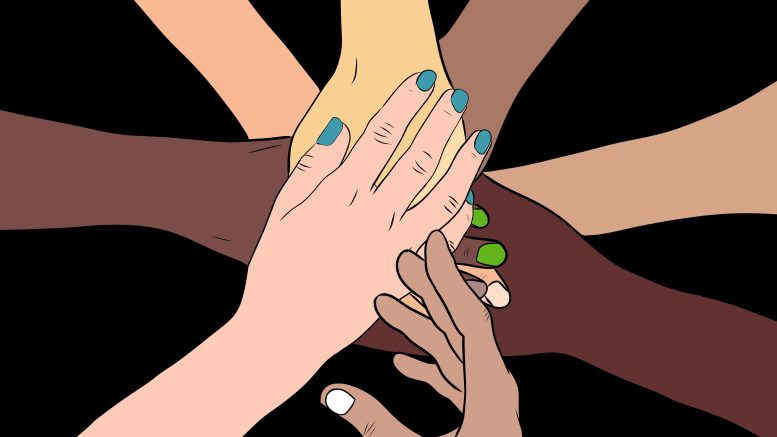Society is awful — homophobic, transphobic, racist, ableist, misogynistic, imperialistic and classist too. With this horrible cloud clogging up our social stratosphere, institutions jostling to appear inclusive start to seem more threatening than promising.
The government of Canada trumpets its own efforts to promote inclusion “at home and abroad” on its website, flagging inclusivity as something that makes societies more — this is the exact word it uses — “innovative.” The University of Manitoba’s centre for the advancement of teaching and learning brands inclusivity as more than just “an invitation to join a group,” also instilling in people a sense of “mattering and belonging.”
Inclusion is an important stepping stone toward a more virtuous, just, righteous, anti-racist, anti-sexist etc. world, but it’s not a productive political goal.
Any critique of inclusivity is going to initially ring alarm bells for people who are leery of right-wing hand-wringing about political correctness gone mad. Rest assured that I am no right-winger. I am an anarchist, which means my Marxist friends talk about me behind my back and I squabble with people on Reddit about sectarian philosophical issues.
Look again at the language that the government of Canada and the U of M use to describe inclusivity. You might notice how capitalistic Canada’s language is — inclusivity makes societies innovative, as if innovation is inherently good. The U of M focuses on interpersonal things like feeling as if you matter. I sometimes feel like I matter amongst men, but that doesn’t mean the space is generally inclusive to women.
These websites make no mention of how inclusivity rights wrongs or straightens out a skewed picture. No, inclusivity makes societies more innovative, it makes members feel like they matter, like this is a start-up for an accursed specialized dating app that needs to reinvent a broken wheel.
There are problems with inclusivity as a political horizon, but because it is so ill-defined and palatable it is easily absorbed into the tissues of oppressive systems. We have to think about what inclusivity actually looks like when we try to execute it, otherwise it amounts to including oppressed people in a racist, homophobic, sexist space and calling it a day.
Making spaces inclusive, and all the labour that involves, falls far too often to the very people who need to be included. Scholar Sara Ahmed writes in her book On Being Included that when she first spoke up about her colleagues’ laissez-faire attitude toward addressing racism, she was invited to take on equity, diversity and inclusion work.
Therein lies another problem: students, staff and faculty in universities are asked to do the work to make exclusive spaces inclusive and perform the day-to-day tasks they’re paid for.
In my view, inclusivity is supposed to rectify injustices. For example, inclusivity ought to extend opportunities to racialized people where racism has deprived or continues to deprive them of those opportunities. So how is any injustice being rectified if racialized people are asked to take on extra work in addition to their regular workloads for the sake of making a racist institution less racist?
Does inclusivity at its core even do what we want it to do? I think the reason inclusivity is adopted by government bodies and universities alike is that it is premised on one assumption: the systems and societies we live with right now are basically fine. There’s no need to smash it all to bits and rebuild from the ground up. All we need to do is sprinkle in some mentally ill bisexual women and we’ll be golden.
Inclusivity is so easily warped to suit institutions and allow them to take on the sheen of proactive entities oriented toward justice, and this has prompted some scholars to ask whether or not there aren’t some problems with the foundational principles inclusivity is built upon.
Carleton University professor of sociology and anthropology Kelly Fritsch writes about the problem with inclusivity in disability rights in Keywords for Radicals. Inclusion in a space where disabled people were previously excluded sounds great, she says, but focusing only on inclusion individualizes systemic problems.
Inclusivity presumes that people’s exclusion begins with each individual person’s exclusion and is solved with those people’s inclusion. Inclusion does not in and of itself restructure a world that is designed to be ableist, one that considers disabled bodies faulty and able bodies as the default.
As a political goal, inclusivity falls short of action that leads to substantial change, but this is not to say that its limitations justify exclusiveness. It’s very, very easy to implement inclusion measures because they don’t require disrupting a system, and being inclusive is the bare minimum any of us can and should do.
It seems to me that people who are politically pubescent suffer from an undercooked imagination at times, however well-intentioned they are. So many are stuck anxiously tabulating all the different individual people who might be excluded from their merch company’s product offerings or from their hyper-niche essay about anime sex scenes that they never pause to consider the big questions.
I doubt a just world looks as simple as a woman in a managerial position at Cineplex. If we stretch our imaginations, we might be able to envision a world where unjust hierarchies and systems themselves are shattered to make room for something new.


